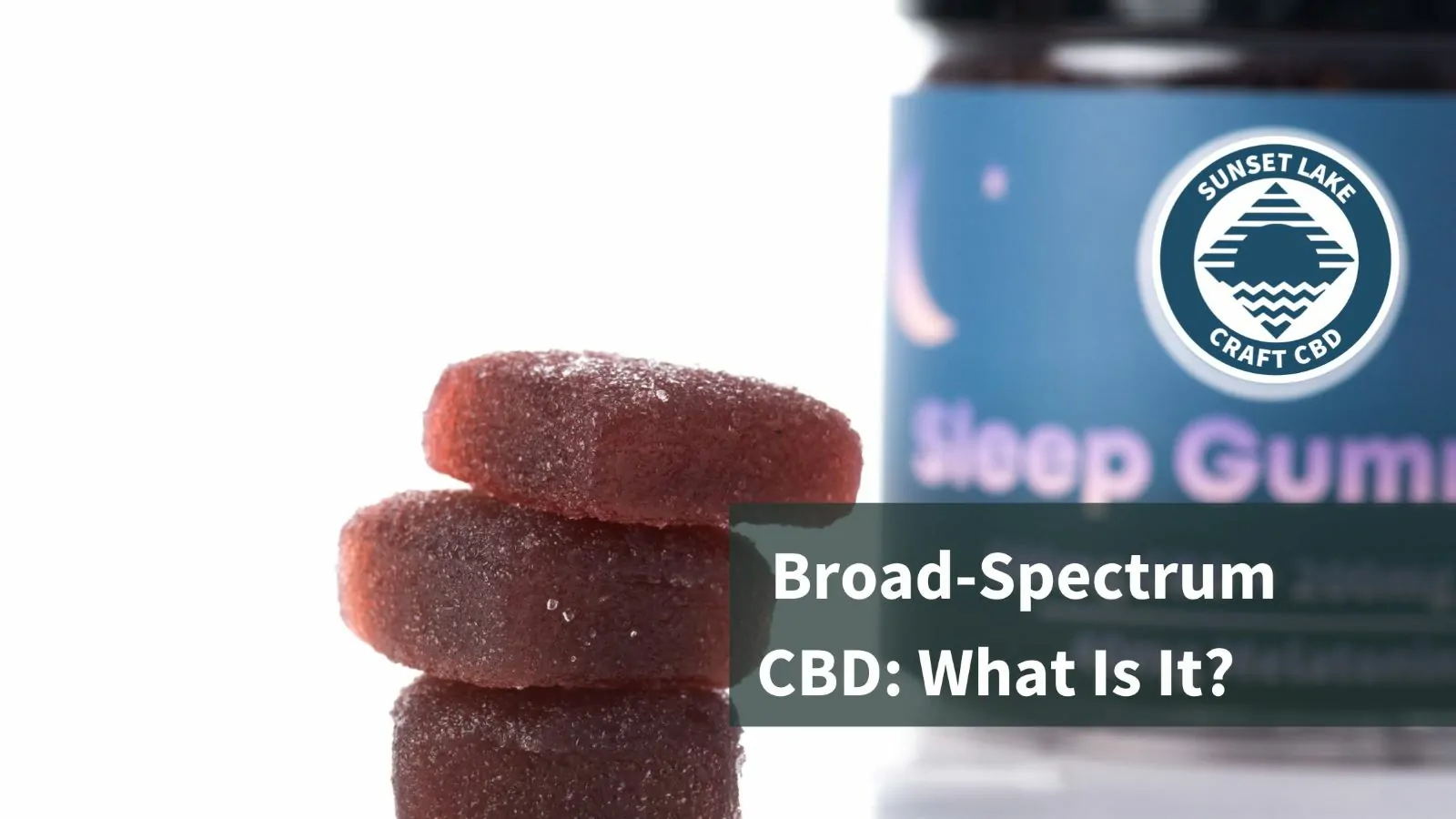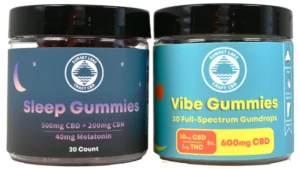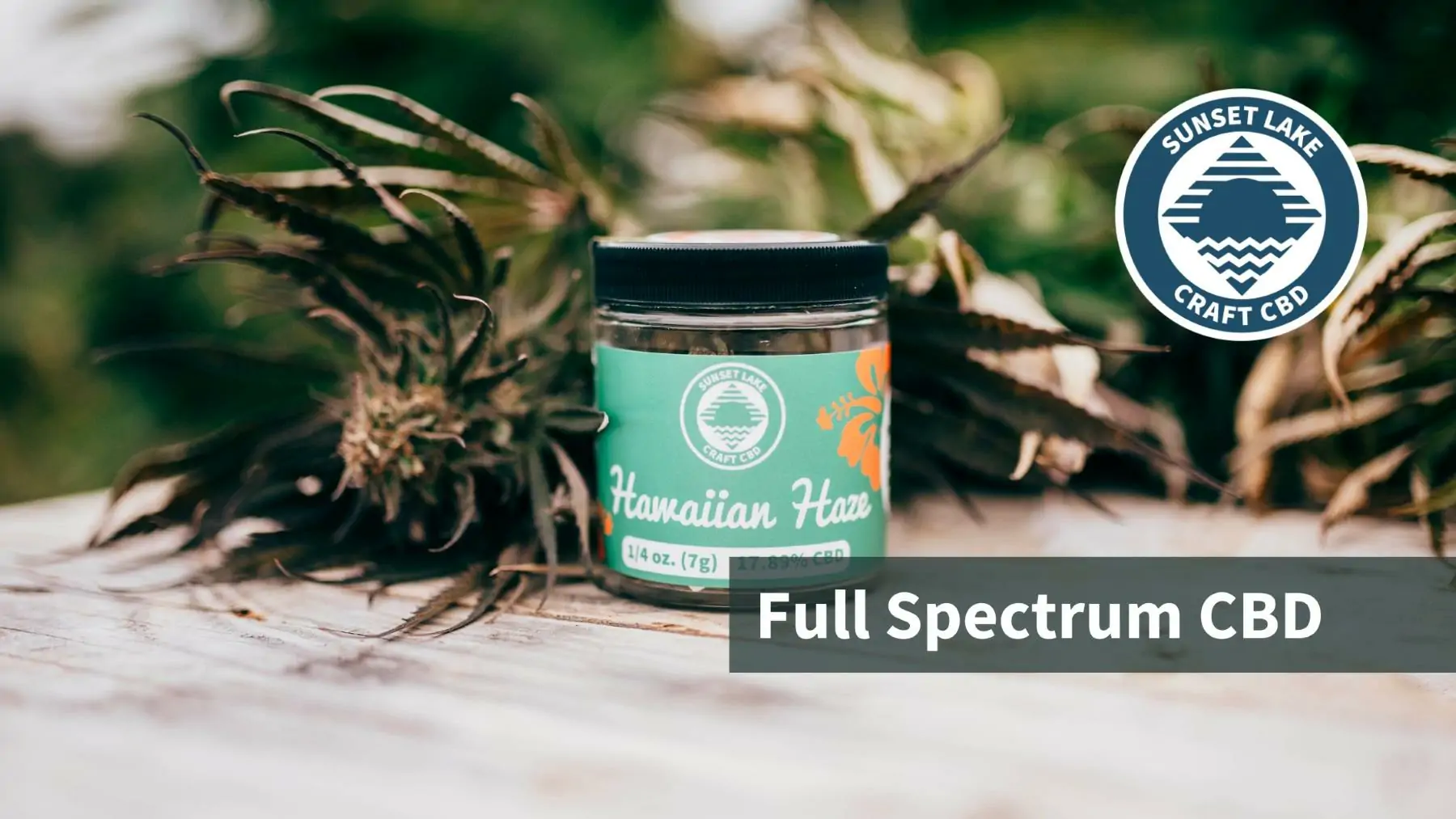Broad-spectrum CBD is one of the three types of CBD and an important THC-free middle ground between full-spectrum CBD and CBD isolate. In this post, we’ll cover what broad-spectrum CBD is, how it’s made, and the pros and cons to consider before purchasing.
What is CBD?
First, let’s review what CBD is. When we discuss CBD, we could be referring to a few things.
CBD can mean the cannabinoid CBD—short for cannabidiol. Cannabidiol is a non-psychoactive compound that helps regulate our body’s endocannabinoid system. We can also use CBD as an umbrella term to refer to the extract of a hemp plant. In this case, “CBD” includes several hundred other organic compounds extracted from the hemp plant like cannabinoids, terpenes, flavonoids, and more. In the context of this post, unless otherwise clarified, we’ll be using the second, more “broad,” definition of CBD.
What is Broad-Spectrum CBD?
Broad-spectrum CBD is one of three CBD subcategories. The other two are called “full-spectrum CBD” and “CBD Isolate,” sometimes referred to as pure CBD.
- CBD isolate is a hemp concentrate that’s refined into pure crystallized CBD (100% purity is nearly impossible to achieve, and most in the hemp industry settle for 98-99% purity).
- Full-spectrum CBD refers to an extract that contains all natural compounds at the time of harvest.
Broad-spectrum CBD is the happy middle ground between full-spectrum and CBD isolate. It can contain any combination of cannabinoids, terpenes, and other naturally occurring compounds found in the hemp plant—except for THC.
What Makes Broad-Spectrum CBD Different?
To be considered and marketed as “broad-spectrum,” the product and the extract it is made from must not contain any THC. This includes delta-9 THC, delta-8, and all other tetrahydrocannabinol analogs.
We can think of a broad-spectrum CBD product as being made with full-spectrum CBD with the THC removed, or made with CBD isolate combined with other cannabinoids. Essentially, it can be anything in between these two extremes.
Comparatively, many competitors’ websites highlight the fact that broad-spectrum CBD provides a THC-free option while retaining other beneficial compounds from the hemp plant. This is particularly appealing for users who want to avoid THC but still benefit from the entourage effect provided by the other cannabinoids and terpenes.
How is Broad-Spectrum CBD Made?
There are two primary methods to make broad-spectrum CBD: remediation and addition. Each method has its own advantages and disadvantages, which are often discussed in detail on competing websites.
- Remediation: This process involves removing THC from a full-spectrum CBD extract using advanced techniques like flash chromatography. Flash chromatography separates the cannabinoids by passing them through a medium that captures the THC, allowing the other compounds to pass through. This method retains most of the natural profile of the hemp extract, minus the THC.
Flash chromatography can be visualized as a deck of cards full of different suits and numbered cards, each representing a cannabinoid. Without remediation, we accept the deck as is. But with flash chromatography, we can spread the cards out and remove the ones we don’t want, such as the “jokers” of delta-9 THC and THCa. Afterward, we reshuffle the deck, resulting in a broad-spectrum CBD extract. - Addition: This method involves combining cannabinoid isolates together to create a broad-spectrum product. This approach is more common for broad-spectrum CBD edibles, such as Sunset Lake CBD’s own CBN Sleep Gummies. While this method can be critiqued for not being as natural, it allows for precise control over the cannabinoid profile and dosages, which can be beneficial for achieving specific effects.
What About Terpenes?
Terpenes are aromatic compounds found in the hemp plant that contribute to its flavor and aroma and may enhance the effects of cannabinoids. Because of the growing body of research around terpenes and how they modulate a user’s experience, their presence in broad-spectrum CBD products is often a topic of interest.
However, in broad-spectrum CBD production, terpenes can sometimes be lost, especially if isolated cannabinoids or refined distillates are used. Competitors’ pages often emphasize products that retain or reintroduce terpenes to enhance the user experience.
Pros of Broad-Spectrum CBD
Partial Entourage Effect: Broad-spectrum CBD offers some benefits of the entourage effect, which refers to the synergistic interaction of cannabinoids and terpenes in the body. This is a significant advantage for users who want to avoid THC but still experience enhanced benefits from other hemp compounds.
Non-Psychoactive: Broad-spectrum CBD is ideal for individuals sensitive to THC. The psychoactive cannabinoids like delta-9 THC, delta-8 THC, delta-10, THCa, and others are removed during the process, making it a non-psychoactive option.
Legal Considerations: Complies with varying THC limits in different regions. In the United States, the legal THC limit for hemp products is 0.3%, but some parts of Europe have stricter limits, such as 0.05%. Removing THC completely from the product is a way to navigate these legal constraints.
Drug Testing: Broad-spectrum CBD is suitable for individuals subject to drug tests, as it lacks THC. Drug screenings typically test for THC metabolites, and even trace amounts of THC can result in a positive test. Provides a safer alternative for these situations.
Cons of Broad-Spectrum CBD
Purification & Quality Considerations: The extraction process might leave residual solvents or trace amounts of THC. This is a concern especially if the product is made using the remediation method. Users should always check the product’s certificate of analysis to ensure it is free from harmful residues and meets quality standards.
Incomplete Entourage Effect: While broad-spectrum CBD offers some of the benefits of the entourage effect, it lacks the full therapeutic effects of THC. THC has been found to help manage sleep, depression symptoms, and act as an appetite stimulant. The absence of THC in broad-spectrum CBD means these potential benefits are not fully realized.
Price: Broad-spectrum CBD is often more expensive due to the special skills and technology required for its production. Competitors also highlight this cost difference, noting that the advanced methods used to remove THC or combine cannabinoids can increase the final product price.
Broad-Spectrum CBD: Common Questions
Is Broad-Spectrum CBD Safe?
Assuming that the extract is made correctly, broad-spectrum CBD is safe for consumption. As with all CBD products, side effects are possible though relatively minor. Always ask the vendor for certificates of analysis to ensure that the product is produced and purified properly.
Is Legal?
Broad-spectrum CBD is federally legal in the United States via the 2018 Farm Bill. For more information about your local area, state, or country, please contact a local attorney. Competitors’ websites often provide legal updates and specific information relevant to different regions to help users navigate legal complexities.
How is it Different from Full-Spectrum CBD?
At the core of this question is the presence of THC. If a CBD product contains both CBD and THC, it can be called a full-spectrum product. Broad-spectrum CBD contains CBD and other cannabinoids, excluding THC. This distinction is crucial for users who want to avoid THC for personal or legal reasons.
How Long Until it Starts to Work?
Onset time is product-dependent. For specific information, refer to the product guidelines or contact the manufacturer. Competitors often provide detailed information about onset times for different product forms, such as oils, edibles, topicals, and more.
What Forms Does Broad-Spectrum CBD Come In?
It is available in various forms, including oils, edibles, beverages, pet treats, topicals, and more, except for smokables. This variety allows users to choose the product form that best suits their needs and preferences.
Conclusion
Offers a valuable option for those seeking the benefits of CBD without the presence of THC. By understanding the different production methods, potential benefits, and considerations, consumers can make informed decisions about whether broad-spectrum CBD is right for them. if you need more information contact with us.



